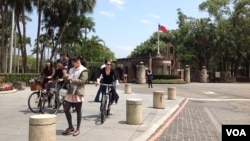Pro-China political statements by Taiwanese universities seeking to sustain enrollment by students from the mainland are presenting a new obstacle to the Taipei government's goal of decreasing its dependence on its powerful political rival.
As many as one third of the 152 higher-learning institutions in Taiwan, many of them private schools that depend on overseas students ahead of an expected fall in local enrollment, have issued documents or statements supportive of Beijing’s political views, local media reports say.
The statements usually promise that mainland Chinese students will not be exposed to information suggesting Taiwan and China are separate countries or supporting Taiwan’s legal independence from China.
“We are just saying to mainland Chinese students that our curriculum won’t touch on politically sensitive activities and then that we won’t carry out one-China, one-Taiwan, two-Chinas or Taiwan independence activities,” said Liao Pei-an, head of publicity with Shih Hsin University, a private Taipei college for news media students.
Taiwan’s Ministry of Education declined Wednesday to estimate the number of schools with pro-China statements, but said on its website last week exchanges should be “equal, win-win as well as respectful of academic freedom.”
Communist Beijing sees the two sides as one, though they have been separately ruled since the 1940s. Opinion surveys indicate most Taiwanese prefer their island’s autonomy. Beijing insists the two sides eventually reunify.
Some parents in China fear political differences might cause conflicts between their children and the Taiwanese. Universities and government bodies in China that approve study in Taiwan also may feel they need to be more careful under today’s Taiwan leadership, said Nathan Liu, international affairs and diplomacy professor at Ming Chuan University in Taiwan.
The statements are probably aimed at easing those concerns, he said.
“My guess would be that first, students or family, parents, they believe that Taiwan is not a good place to go,” said Nathan Liu. “Number two, schools, the people in charge believe ‘I better play safe. I don’t want to get in trouble if the policy changes or anything and I still have students in Taiwan.’”
Shih Hsin University drafted its statement because some local governments in China need them before approving study in Taiwan, Liao said. The school does not place limits on classroom instruction to mainland Chinese students, he said.
“Provincial governments also have pressure from their superiors and to let these students go study in Taiwan they might need this document,” Liao said. “These are a minority of the provinces."
The pro-Beijing statements from universities came to light after Taiwan President Tsai Ing-wen took office in May and may have picked up since her inauguration.
They undermine her strategy of stepping away from economic dependence on China in favor of stronger relations with countries such as India and those in Southeast Asia. In her May 20 inauguration speech, Tsai said a shift in economic priorities to India and Southeast Asia would “bid farewell to our past over reliance on a single market,” a likely reference to China.
Tsai’s government and officials in Beijing have never talked because they cannot agree on how to regard each other – as two parts of China or something that recognizes Taiwan’s self-rule. The impasse has frustrated Beijing, which scholars in Taiwan say is slowing getting back at Tsai through economic means.
The number of short-term university students from China to Taiwan has suddenly fallen this academic year. The number of students in non-degree programs fell from 34,114 in the 2015-2016 academic year to 32,648 the current year, according to education ministry figures. The number had more than doubled from 2011 to 2013.
Since Tsai took office, the number of mainland Chinese group tourist arrivals has also declined, with a cut of about 30 percent between May and the end of 2016. Their decline, often blamed in Taiwan on pressure from Beijing, follows a sharp rise after the two sides agreed to open tourism in 2008 when overall relations were better.
Tour operators protested against Tsai in September and experts in Taipei fear other sectors dependent on China could follow if Beijing cramps their trades to make a political statement. China was Taiwan’s top export market last year, bringing in about $111 billion with Hong Kong included.
“Of course the business community, especially the businesses in China, are pressured to say things that counter the Taiwan government actions,” said Lai I-chung, former vice president of Taiwan Think Tank and China policy architect for the ruling party. “(China) wants to put pressure on Taiwanese businessmen. But these businessmen are not representing the interests of Taiwan, just representing their own interests.”
Students from China generally say Taiwanese students treat them well and they like the lack of political curbs on classroom instruction that they find in China. Those impressions may clash with earlier concerns of isolation over political differences.
“Going to class and things like that are more open and unregulated, and then for things like lifestyle, the campus management feels a bit freer,” said Wang Junwen, a third-year Chinese literature major from the Shanghai area who is studying in Taipei from February through June.
“In mainland China, it would be managed more strictly as well as supervised more precisely,” she said.




